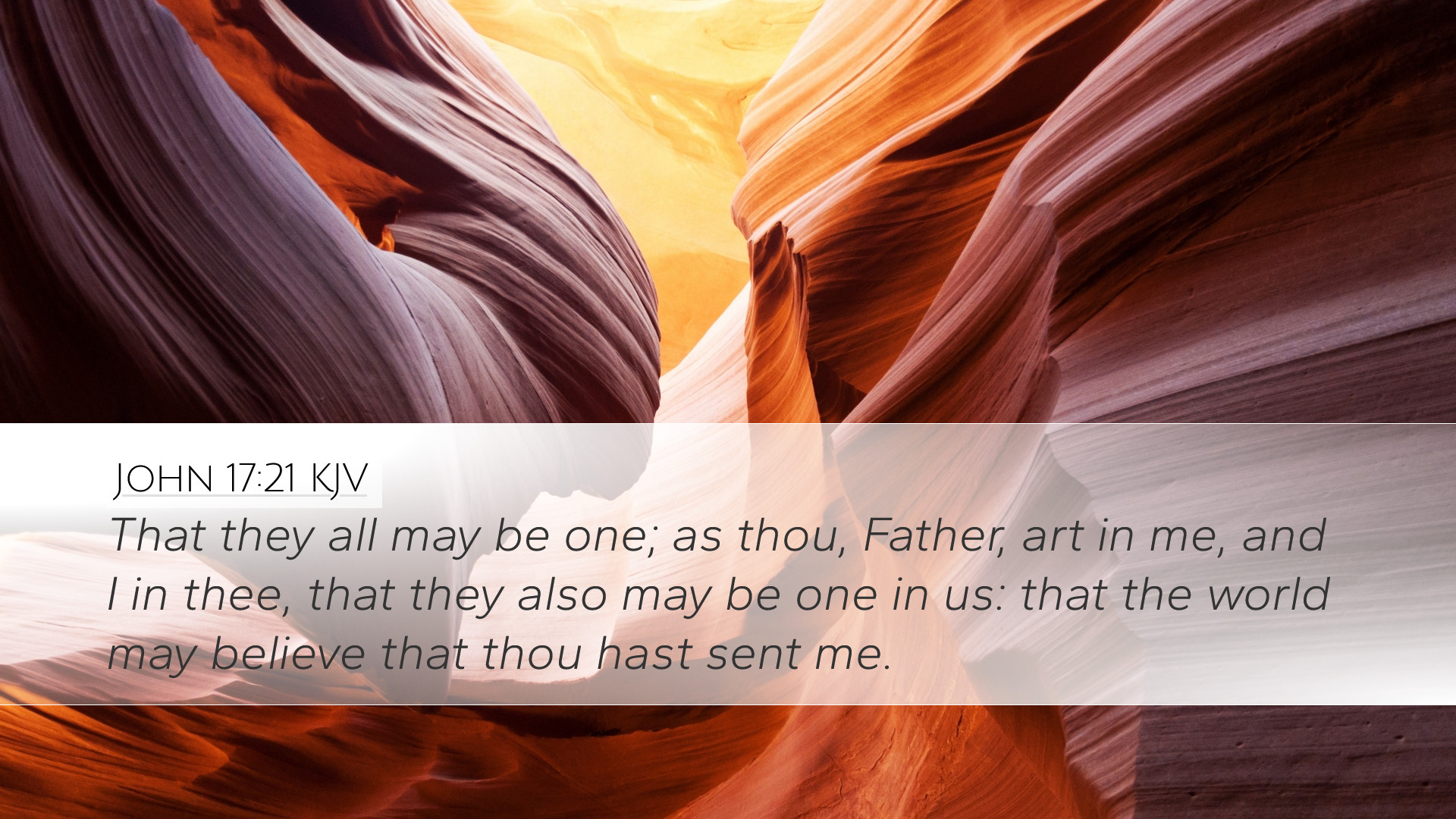Old Testament
Genesis Exodus Leviticus Numbers Deuteronomy Joshua Judges Ruth 1 Samuel 2 Samuel 1 Kings 2 Kings 1 Chronicles 2 Chronicles Ezra Nehemiah Esther Job Psalms Proverbs Ecclesiastes Song of Solomon Isaiah Jeremiah Lamentations Ezekiel Daniel Hosea Joel Amos Obadiah Jonah Micah Nahum Habakkuk Zephaniah Haggai Zechariah MalachiJohn 17:21
John 17:21 KJV
That they all may be one; as thou, Father, art in me, and I in thee, that they also may be one in us: that the world may believe that thou hast sent me.
John 17:21 Bible Commentary
Commentary on John 17:21
Text of the Verse: "That they all may be one; as thou, Father, art in me, and I in thee, that they also may be one in us: that the world may believe that thou hast sent me."
Introduction
The prayer of Jesus in John 17 encapsulates the heart of His mission and His desire for unity among His followers. In this verse, Jesus requests that all believers may be united in the same way that He and the Father are united. This profound petition not only reflects on the nature of the relationship within the Holy Trinity but also challenges the church throughout the ages to pursue a unity that transcends cultural, social, and denominational boundaries.
Theological Significance
Matthew Henry's Insights:
- Henry emphasizes the intimate relationship between the Father and the Son as the model for Christian unity. He states that just as Christ is in the Father and the Father is in Christ, believers are to share in that divine fellowship.
- This prayer implies a divine origin of unity; it is not merely a human effort, but a spiritual reality that arises from being in Christ. The unity is not just organizational but organic—a unity that stems from being part of the body of Christ.
Albert Barnes' Reflections:
- Barnes notes that the phrase "that they all may be one" suggests a desire for a complete unity among believers. This unity serves a dual purpose: it glorifies God and acts as a testimony to the world regarding the truth of Jesus’ mission.
- He stresses that this unity is vital for the Church's witness to the world and is a reflection of the relationship between Christ and the Father, which is characterized by love, understanding, and mutual purpose.
Adam Clarke's Analysis:
- Clarke discusses the significant theological implications of being "one in us." This phrase indicates that the unity of believers is part of God's divine purpose and plan, suggesting that fellowship with God results in fellowship with one another.
- He also highlights that this unity is inherently linked to the Church's mission. Clarke urges believers to strive for harmony, reminding them that such unity is essential for the Church’s effectiveness in evangelism.
The Nature of Unity
In examining the kind of unity proposed in John 17:21, several aspects emerge that are worth noting:
- Spiritual Unity: This unity is rooted in shared beliefs and faith in Jesus Christ. Believers are called to be united in spirit, holding fast to the foundational truths of the Gospel.
- Relational Unity: The call for unity extends to how believers interact with one another, fostering relationships characterized by love, humility, and grace.
- Missionary Unity: The unity Jesus speaks of is impactful for the Church’s mission. The world is to recognize the legitimacy of Christ’s ministry through the visible oneness of His followers.
Practical Implications for the Church
Understanding John 17:21 has several practical implications for the life and ministry of the Church:
- Promote Oneness: Leaders and members should encourage cooperative relationships among different denominations and traditions, working towards a common purpose of sharing the Gospel.
- Conflict Resolution: The Church should model forgiveness and reconciliation, showing the world that unity does not mean uniformity, but rather diversity harmonized through Christ.
- Prayer and Dependence on the Spirit: fostering a lifestyle of prayer that seeks the Spirit’s help in achieving and maintaining this desired unity. Without divine intervention, true unity is unlikely to occur.
Conclusion
John 17:21 serves as a cornerstone for understanding the concept of unity among believers. It invites all Christians to pursue a deep, abiding unity that reflects the divine relationship of the Father and the Son. As Matthew Henry, Albert Barnes, and Adam Clarke elucidate, this unity is not merely a goal but a manifestation of the believer's connection to Christ and His mission. Therefore, as the Church seeks to fulfill its calling, embracing the essence of this prayer in John 17 should inspire believers toward a vibrant witness of God's love to the world.


